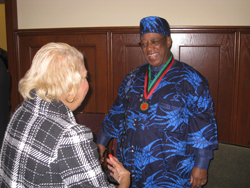A sage exits
Thaddeus Mathis, respected School of Social Administration professor and mentor, steps down from full-time teaching
| When Thaddeus Mathis came to Temple University in August 1970, he was a young professor armed with degrees in teaching and social work and a background in the black independent political movements sweeping Philadelphia during that time.
While on its face these three things wouldn’t necessarily connect, Mathis has made it his life’s work to use all three to turn out generations of social workers who understand the importance of activism during his more than three decades in Temple’s School of Social Administration. “There is an advantage to having political science knowledge for social work students,” he said. “These two disciplines blend well together. Having knowledge of both helps you understand how people behave. I’ve always felt comfortable doing both.” |
 Photo courtesy of the School of Social Administration
Professor Emeritus Thaddeus Mathis greets Jacqueline Leonard (wife of Curtis Leonard, dean emeritus
of the School of Social Administration), at a reception last month. Mathis is retiring after more than three decades in Temple's School of Social Administration. |
|
Mathis, a winner of the Christian R. and Mary F. Lindback Foundation Award for Distinguished Teaching, steps down from full-time teaching this semester to become a professor emeritus in the department. After working as a planner in the Model Cities Program, Mathis left that job and began his teaching career at Temple teaching a course titled “The Politics of Poverty” as an adjunct professor in the Political Science Department. He was then approached by the director of the New Career Ladders in Social Welfare Program in the School of Social Administration to join its staff, which he did in 1970, Mathis said. Among his colleagues during his time in the School of Social Administration was current Interim Dean Linda Mauro. She says Mathis’ ability to combine his knowledge of social policy and social work has been a big plus for the department and the students within it. “He has brought a great deal to the school,” Mauro said. “He’s a great thinker and he has had a big influence on what we teach our students in terms of social justice and empowerment.” Among the steps Mathis took toward that goal was to create the Institute for Africana Social Work in 1991 as a means to teach social workers how to best help African American families facing tough circumstances while maintaining cultural sensitivity. The institute was based on a program that Mathis was building for the National Association of Black Social Workers and offered students in the social work program the chance to get a certificate in the curriculum, he said. Through the program, students got the chance to learn the importance of advocacy in social work practice. Mathis also served as a mentor and guide to many social work students, some of whom have gone on to become teachers and social workers themselves. When she entered Temple’s Masters in Social Work program in 1973, Patricia Reid-Merritt was nervous about succeeding within it and came close to leaving before Mathis convinced her that she had the potential to do well and convinced her to stay. He was a tough professor, said Reid-Merritt, who is now a professor of social work at the Richard Stockton College of New Jersey, although she also credits Mathis with not only making her the professional she is today, but also reinforcing the importance of community activism in her work. “One of the courses that I took with him was called the ‘Role of the Black Social Worker,’ she said. “It changed my life. I wanted not just to be a great, effective social worker, but a social work educator as well. Dr. Mathis taught me to ask questions, investigate, seek out new knowledge, making certain that it was relevant to the population that I was trying to serve. As a social work educator and activist, everything I have done in my professional career has been influenced by the teachings of Dr. Mathis.” But while creating a paradigm for black social workers to follow became his main focus, helping blacks control their own socio-political destinies was never far from Mathis’ mind. In 2007, Mathis joined with Nathaniel Norment, chair of Temple’s Department of African American Studies, to create the Center for African American Research and Public Policy. Funded by a $100,000 grant from State Rep. Dwight Evans, the center’s mission is to produce studies and other materials pertaining to the black community and pairing that research with policies designed to allow the community to participate in finding solutions to those problems. Although he is planning on taking it easy for a few months, Mathis hasn’t ruled out utilizing the “professor” part of his professor emeritus status. “I liked the classroom part [of being a professor]”, not the meta work of meetings and other things,” he said. “I hope to rediscover the joy of teaching when I’m not teaching full time. I hope to have time to sum up my experiences so that I can pass them on to the next generation.” |
|